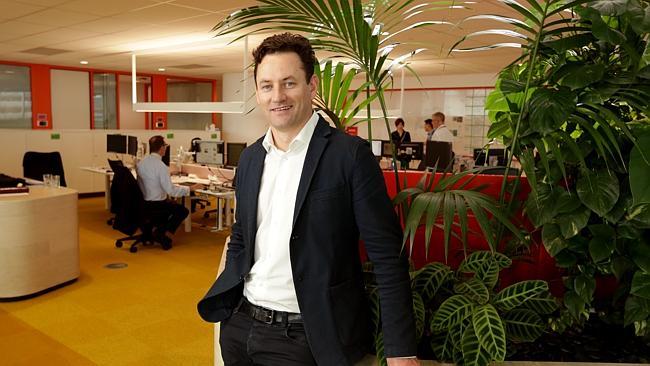CTPartners says digital technologies will offer huge jobs growth
JOBS in data management and analytics will be a massive growth area over the next decade.

Jason Johnson jokes that if his twin six-year-old daughters show any early numeric capabilities, he will encourage them to become data analysts.
Johnson, Asia Pacific managing partner at CTPartners, says big data will be a massive growth area over the next decade, along with digital technologies and any role involving analytics.
“Technology needs are causing rapid investment for those who are successful and those that are not,” Johnson says.
“There’s a huge need for investment in digital technologies. The other is big data, that’s throwing up a whole range of roles around capabilities. There are also roles around analysis, dissecting and delivering high-quality data around customer needs.”
Many of those jobs did not exist five years ago, but the workforce is changing so quickly white collar workers will be in demand to fill positions in newer technologies as other professions stagnate.
Johnson says concerns about cyber security will also see larger companies looking to employ people to keep systems safe.
During a visit to New York late last year, Johnson says two Fortune 500 companies were grappling with share prices plunges after hackers stole data.
“Cyber security is a huge and growing space,” he says. “An organisation that has customer data has to protect that.”
Aaron McEwen, a director of member-based business advisory body CEB, says there is little optimism in the employment sector compared to this time last year, when businesses were riding a wave of hope after a change in federal government. “A lot of people are thinking 2015 will be tough,” McEwen says. “We work with 300 senior human resources executives, and HR executives are among the least optimistic.”
McEwen says that with fewer companies increasing staff the focus last year turned to productivity gains of up to 27 per cent, which will continue this year as staff freezes are maintained.
“Board directors and chief executives are looking for greater efficiencies coming out of their people,” he says.
McEwen says that will come through greater engagement with workers and finding out how to unlock their talents. “They’re already working hard but pushing them harder is not going to necessarily get more out of them.”
Workers will also need to increasingly adapt to collaboration, particularly with colleagues in different locations in Australia and overseas, as globalisation becomes more prevalent.
To enable more people to work collaboratively, Hassell principal Steve Coster says offices will be redesigned to create dynamic spaces. “There will continue to be open plan but the mix of spaces will get richer and better,” Coster says. That includes the growing number of collaborative hubs for small businesses or people who do not need an office, which can include dynamic spaces for private meetings and group work.
“The other thing that’s clear about what will be a coming trend is that the success of places is not just the spacing, it’s the way they cultivate the workers,” he says.
“It’s about how you need other workers, how you use their expertise, what learning is available from your members and connections by referral or collaborations, or mentoring.”
Coster says recognition of how workplaces affect health — mental or physical — will also grow.
“There’s been a lot of debate this year about the health issues associated with sedentary work and the impacts you get from movement through the day,” he says. “Research from the Baker IDI Institute says even if you go to the gym for an hour a day and sit at your desk all day you’re worse off than someone who stands at their desk.”
To improve health, offices are being designed with a diversity of space, more light, and to ensure people are being moved out of cubicles and given a greater freedom over the tasks they choose, rather than prescriptive work.
Beyond this year, Hay Group business futurist Georg Vielmetter says several long-term “mega trends” are affecting the world’s workforce.
The European-based sociologist says mega trends are defined by the time over which they develop, their global reach and scope, and how much of a significant impact they have. He has identified globalisation as his first workforce mega trend, and it is obvious how the internet has helped companies reach new markets.
“There has been a shift from west to east … and the purchasing power is also going there,” Vielmetter says.
His second trend is the changing environment, including climate change, the increasing use of resources and how they affect costs, and growing government regulation.
Vielmetter says the third trend is individualisation, and how people are living by their own values and belief systems more than ever.
“Work is not just for the money, it’s more important for people to do what they love,” he says.
“The middle class has grown significantly … and this engagement will become really strong in the future.”
Digitalisation has also had a massive impact on workplace culture, as private becomes public and the lines blur. “Leaders have to manage the reputation of their companies much more closely than ever,” he says. “Whatever is said online becomes public immediately.”
Vielmetter says the ageing demographic will affect worksites and the war for talent will intensify, with technological convergence around the corner.
With IT changes likely to affect the workforce for years, Vielmetter says leadership structures will need to adapt because power sharing and co-operation will be more prevalent.
Hay Group Pacific’s head of leadership and talent practice Wendy Montague says Australian businesses also tend to focus on their own workforce, rather than outwardly considering international trends.
Montague says a shrinking workforce brings introversion, rather than a focus on what is happening internationally. “We need to be more flexible and adaptable in Australia,” she says.

